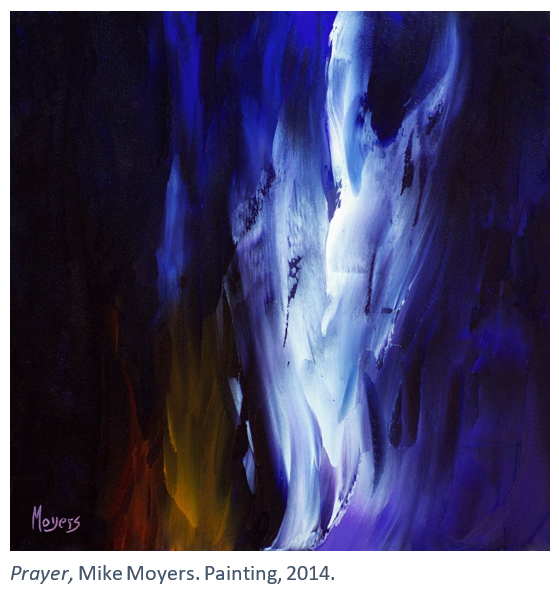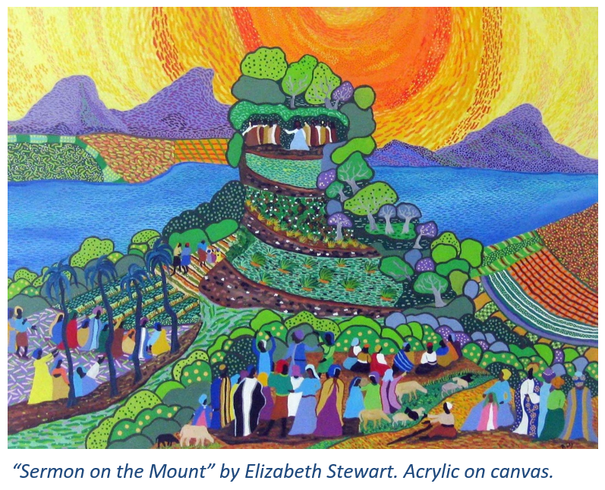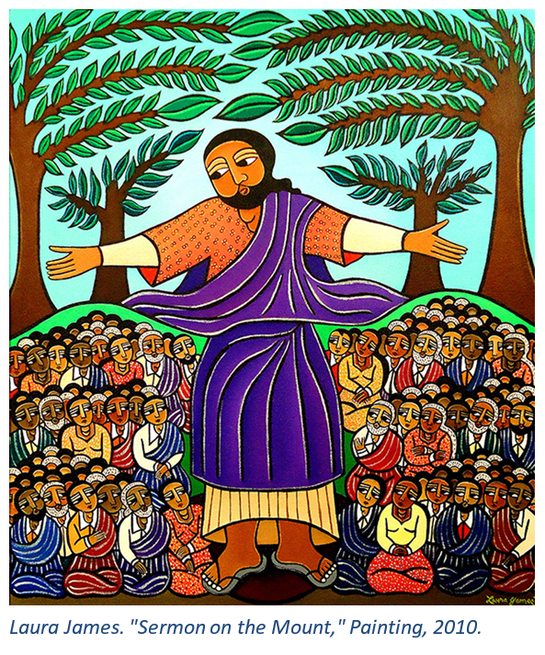|
The story has just begun, and temptation comes knocking. Snakes in the garden. Adversaries in the wilderness. Week one of Lent and our texts seem to want us to think about temptation—those confusing and tricky things that cross our paths and ask us to question what we thought we knew. Is the work of Lent inviting us to reflect on how we engage these temptations, how we respond to this questioning of our knowledge? Would our journey toward Easter be served by reflecting about how best to respond to suggestions that there are other ways of looking at what we thought we knew. Are the characters in our stories being honest, considering the whole picture? And how do we as disciples in a complex world resist being hoodwinked by slanted and prejudicial viewpoints? How do we act to help a full and liberating story be told and heard and acted upon? Important questions—questions that affect our ability to live well together, rarely have easy answers. Thanks be to God we are given a community of faith past and present, and a sacred web of neighbors and siblings whom we can journey with through the temptations of easy answers, if only we would choose to host them in sacred conversation. Enter into worship. Readings: Genesis 2:15-17; 3:1-7 † Psalm 32 † Romans 5:12-19 † Matthew 4:1-11 About the Art: Painting (detail) by Joyce Walker. Card design by Barbara Anderson. This is an image of a series of cards produced for Lent, 2023 based on resources from Sarah Are and sanctifiedart.org. Used by permission.
0 Comments
 “Thus it is written, ‘The first human, Adam, became a living soul’; the last Adam became a spirit that gives life.” ~1 Corinthians 15:45 Humility, vulnerability, authenticity. Three words that draw us into this ancient practice of Lent, of lengthening, of extending and filling out our lives with newness in the same way that the light of day lengthens in Lent. Plants emerge from winter’s rest to explore new growth, new forms of possibility. Humility, comes from hummus—dust, earth, soil—from which we became and to which we return according to the stories of our elders: Dust to dust. Ashes to ashes. Vulnerability. From the Latin vulnus: wound. Indeed, to live is to be wounded, and to (be) heal(ed). To be subject to power and designs greater than ours. To be creature. Authenticity. From the Greek authentes: from two words, autos or self and hentes or doing. One acting on one’s own authority. We are agents with agency, actors with purpose to enact. We are powerful. So here we are, at the doorway to Lent, dusty, wounded, powerful ones seeking to be all that we are, all that we are created to be. Enter into worship. Enter into Lent. Join us this evening at 7:00pm in person or online. Readings: Joel 2:1-2,12-17 or Isaiah 58:1-12 † Psalm 51:1-17 † 2 Corinthians 5:20b-6:10 † Matthew 6:1-6,16-21 About the Art:[i] An abstract painting depicting the words of the psalmist, “Let my prayer be set before Thee as incense, and the lifting up of my hands as the evening sacrifice.“ Mike Moyers loves to paint with the palette knife to keep his work loose, textured and bold. His deepest passion is to use art to communicate matters of faith. From his website: I firmly believe that art is a communion with the soul. Through my art, I strive to make known the beauty and wonder of life and faith. The pieces in this exhibit are inspired by things that have touched my life in a meaningful way. They range from plein air and impressionism to abstract and conceptual. My hope is to successfully communicate those inspirations so that you might be touched as well. [i] Moyers, Mike. Prayer, from Art in the Christian Tradition, a project of the Vanderbilt Divinity Library, Nashville, TN. https://diglib.library.vanderbilt.edu/act-imagelink.pl?RC=57148 [retrieved February 6, 2023]. Original source: Mike Moyers, https://www.mikemoyersfineart.com/.  See, I have set before you today life and prosperity, death and adversity.. ~Deuteronomy 30:15 Choose life. This is what the Creator wishes for us, for all creation! This golden thread runs through the heart of true religion for the verdant flourishing of all life. The commandments, as a rule, are a rule—as in a ruler (it is the same referent for our ruling elders), a measure, a blueprint for a life well lived. Jesus doubles down on the idea and on the Mosaic law in his sermon to the beaten-down crowds: “You have heard it said… I say to you…” He’s here to fulfill, not abolish, the law. But we will want to listen carefully. The crowds surely are. They are not naïve. They know the ways power can twist and manipulate even if they cannot stop it. They see hypocrisy. And so does Jesus. So stop the games, he says. Let your yes be yes and your no be no. Then you will live. Choose life. Enter into worship. Readings: Deuteronomy 30:15-20 † Psalm 119:1-8 † 1 Corinthians 3:1-9 † Matthew 5:21-37 About the Art:[i] Elizabeth Stewart has been involved in a variety of crafts throughout her life. She is a Caribbean Artist whose work is heavily influenced by her Barbadian upbringing and her Lokono Arawak heratige. Her work articulates the vibrancy and creativity of Caribbean Culture. Her paintings are influenced by Religious art of the Renaissance and European Impressionists as well as Indigenous and African Woodcarving. Her current work reflects her consideration of Religion and Race in the Caribbean as well as the landscapes and people as seen through her eyes. [i] Sermon on the Mount, Janice Elizabeth Stewart. Originally from Gallery of Caribbean Art (artgallerycaribbean.com). Retrieved on January 30, 2023 from: https://postmodernmissionary.com/blog/2019/7/22/what-is-a-sermon-anyway. Artist biography adapted from her Facebook page, retrieved on January 30, 2023 from: https://www.facebook.com/artbybaiti.
We continue to keep our financial commitments to our mission partners and staff. If you are not yet able to join us, thank you for remembering to send in your financial pledges and offerings or donating here.
 You are the salt of the earth. You are the light of the world. ~Matthew 5:13, 14 In a recent interview, Robin Wall Kimmerer notes that in Western culture, humility “is to be meek and mild and dispossessed.” In her own Potawatomi way of thinking it is bigger and more stable: “Edbesendowen is the word that we give for it: somebody who doesn’t think of himself or herself as more important than others.” It’s not that you are not important, she clarifies, just that everyone else, everybody is as important, which “creates a “sense of vitality and community and family.” She continues, “Like, dang, aren’t we lucky to be surrounded by these genius bats and incredible fireflies? Humility that brings that sort of joy and belonging as opposed to submission…” Kimmerer wants to see Fox news, but not the one you might think: “What if we were paying attention to the natural world? I’ve often had this fantasy that we should have Fox News, by which I mean news about foxes. What if we had storytelling mechanisms that said it is important that you know about the well-being of wildlife in your neighborhood? That that’s newsworthy? This beautiful gift of attention that we human beings have is being hijacked to pay attention to products and someone else’s political agenda. Whereas if we can reclaim our attention and pay attention to things that really matter, there a revolution starts.” Jesus is seeking nothing less than a revolution as he continues his sermon in Matthew inviting all who hear to consider the light that shimmers from them and their equally radiant neighbor. This, as Kimmerer’s Potawatomi culture understands so well, is the soil that weeds out the toxic systemic assumptions that prevented Tyre Nichols from getting home that January 7th night. It grows the kind of justice that springs up healing in body and soul: bread for the hungry, good news to the poor. Is such the fast that I choose, a day to humble oneself? … Is not this the fast that I choose: to loose the bonds of injustice, to undo the thongs of the yoke, to let the oppressed go free, and to break every yoke? … Then your light shall break forth like the dawn, and your healing shall spring up quickly; ~Isaiah 58:5a, 6, 8a Enter into worship.[i] Readings: Isaiah 58:1-9a † Psalm 112:1-9 † 1 Corinthians 2:1-12 † Matthew 5:13-20 About the Art: Laura James has been working as a professional artist and illustrator for over twenty-five years. In addition to painting sacred images from various religions, she portrays women, families, and scenes of everyday life; blending intricate patterns, text, vibrant colors and sometimes surreal imagery into what she calls “art for the people.” [i] James, Laura. Sermon on the Mount, from Art in the Christian Tradition, a project of the Vanderbilt Divinity Library, Nashville, TN. https://diglib.library.vanderbilt.edu/act-imagelink.pl?RC=57891 [retrieved January 23, 2023]. Original source: Laura James, https://www.laurajamesart.com/collections/religious/.
We continue to keep our financial commitments to our mission partners and staff. If you are not yet able to join us, thank you for remembering to send in your financial pledges and offerings or donating here.
|
worshipYou'll find here links to weekly worship and, where applicable archived service videos. Archives
July 2024
Categories |
 RSS Feed
RSS Feed